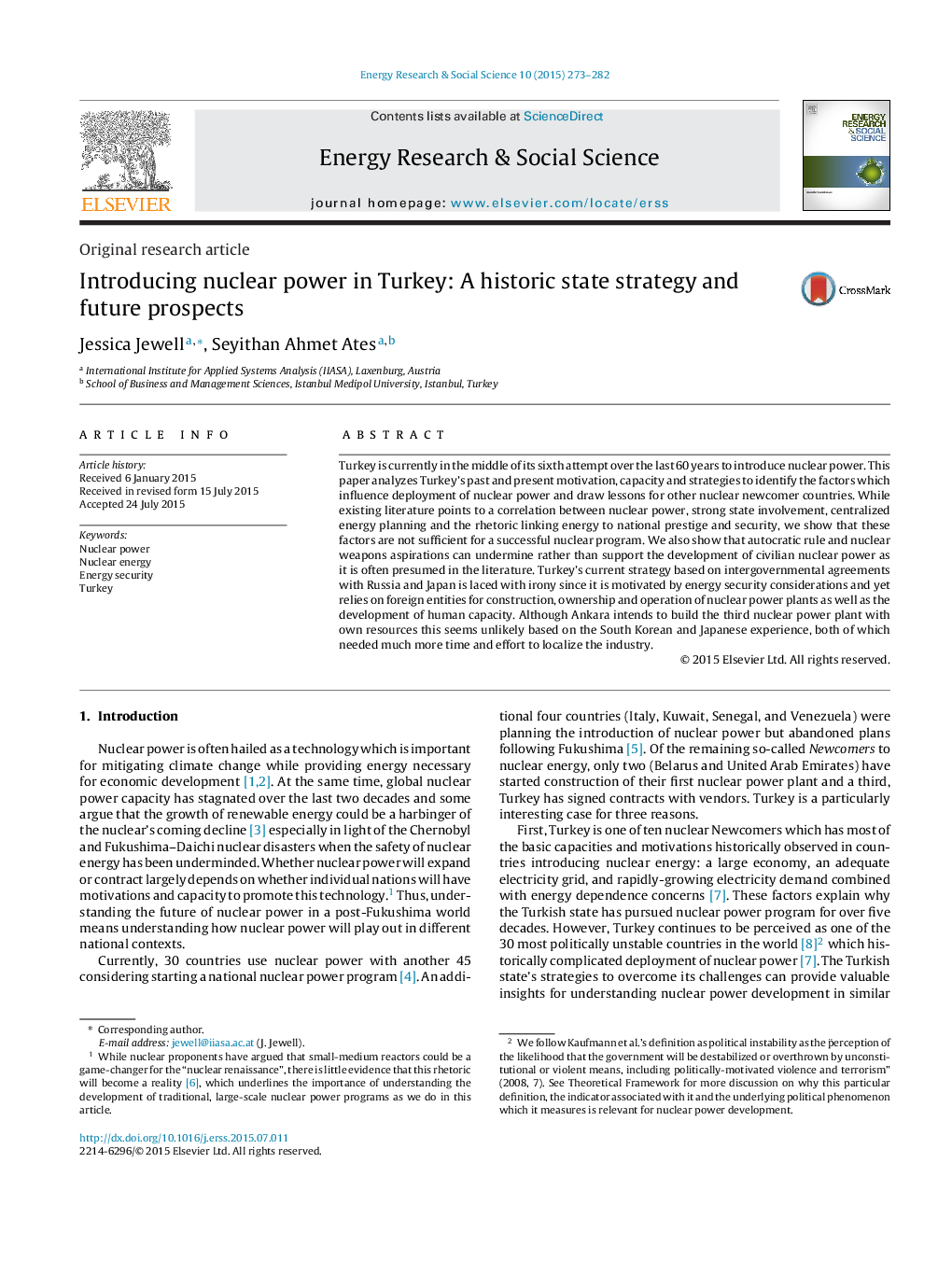| کد مقاله | کد نشریه | سال انتشار | مقاله انگلیسی | نسخه تمام متن |
|---|---|---|---|---|
| 6558581 | 161862 | 2015 | 10 صفحه PDF | دانلود رایگان |
عنوان انگلیسی مقاله ISI
Introducing nuclear power in Turkey: A historic state strategy and future prospects
ترجمه فارسی عنوان
معرفی انرژی هسته ای در ترکیه: یک استراتژی تاریخی و چشم انداز آینده
دانلود مقاله + سفارش ترجمه
دانلود مقاله ISI انگلیسی
رایگان برای ایرانیان
کلمات کلیدی
قدرت هسته ای، انرژی هسته ای، امنیت انرژی، بوقلمون،
ترجمه چکیده
ترکیه در حال حاضر در وسط تلاش ششم خود در طول 60 سال گذشته برای معرفی انرژی هسته ای است. این مقاله انگیزه، ظرفیت و استراتژی های گذشته و حال ترکیه را برای شناسایی عوامل موثر بر استقرار نیروی هسته ای و یادگیری برای دیگر کشورهای نوظهور هسته ای تحلیل می کند. در حالی که ادبیات موجود نشان می دهد که ارتباط بین قدرت هسته ای، مشارکت قوی دولت، برنامه ریزی انرژی متمرکز و انرژی لئونتیک برای اعتبار و امنیت ملی، نشان می دهد که این عوامل برای برنامه ی موفقیت آمیز هسته ای کافی نیست. ما همچنین نشان می دهیم که حکومت مستبدانه و آرمان های سلاح های هسته ای می تواند به جای حمایت از توسعه انرژی هسته ای غیرنظامی، به جای آن که اغلب در ادبیات مطرح شود، تضعیف می شود. استراتژی کنونی ترکیه بر اساس توافقنامه های بین دولتی با روسیه و ژاپن با قضیه ای روشن است، چرا که آن را با توجه به ملاحظات امنیتی انرژی تحقق می بخشد و در عین حال به اشخاص خارجی برای ساخت و ساز، مالکیت و بهره برداری نیروگاه های هسته ای و نیز توسعه ظرفیت انسانی متکی است. اگر چه آنکارا قصد دارد سومین نیروگاه هسته ای خود را با منابع خود بسازد، این به نظر بعید است که بر اساس تجربیات کره جنوبی و ژاپن، هر دو از زمان و تلاش بیشتری برای محلی سازی این صنعت نیاز داشته باشند.
موضوعات مرتبط
مهندسی و علوم پایه
مهندسی انرژی
انرژی (عمومی)
چکیده انگلیسی
Turkey is currently in the middle of its sixth attempt over the last 60 years to introduce nuclear power. This paper analyzes Turkey's past and present motivation, capacity and strategies to identify the factors which influence deployment of nuclear power and draw lessons for other nuclear newcomer countries. While existing literature points to a correlation between nuclear power, strong state involvement, centralized energy planning and the rhetoric linking energy to national prestige and security, we show that these factors are not sufficient for a successful nuclear program. We also show that autocratic rule and nuclear weapons aspirations can undermine rather than support the development of civilian nuclear power as it is often presumed in the literature. Turkey's current strategy based on intergovernmental agreements with Russia and Japan is laced with irony since it is motivated by energy security considerations and yet relies on foreign entities for construction, ownership and operation of nuclear power plants as well as the development of human capacity. Although Ankara intends to build the third nuclear power plant with own resources this seems unlikely based on the South Korean and Japanese experience, both of which needed much more time and effort to localize the industry.
ناشر
Database: Elsevier - ScienceDirect (ساینس دایرکت)
Journal: Energy Research & Social Science - Volume 10, November 2015, Pages 273-282
Journal: Energy Research & Social Science - Volume 10, November 2015, Pages 273-282
نویسندگان
Jessica Jewell, Seyithan Ahmet Ates,
